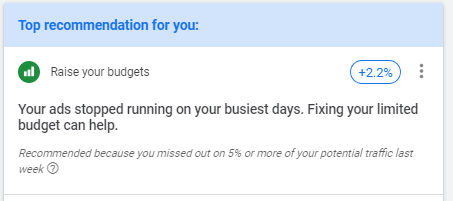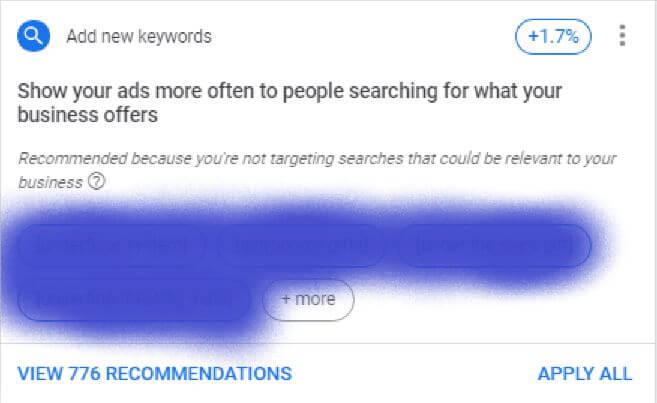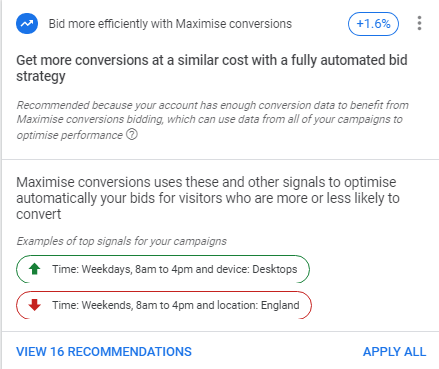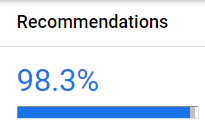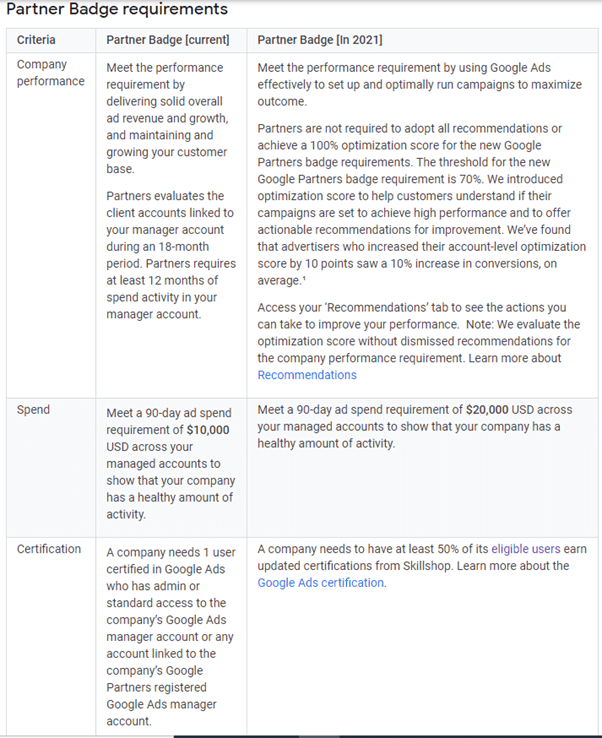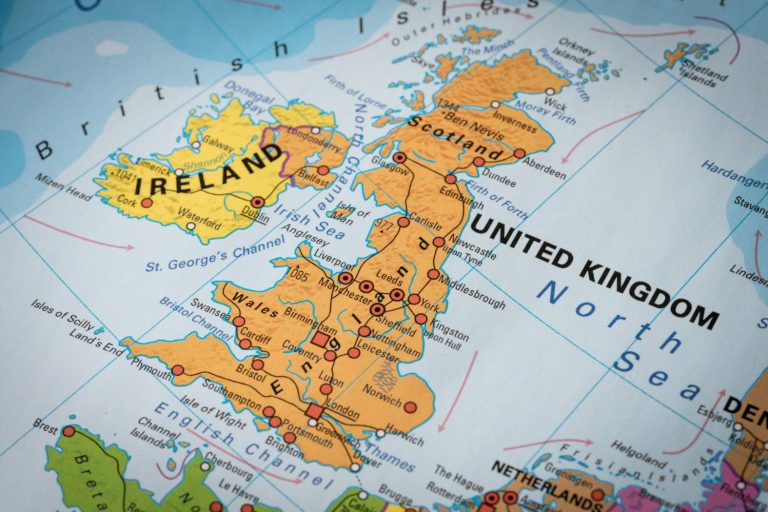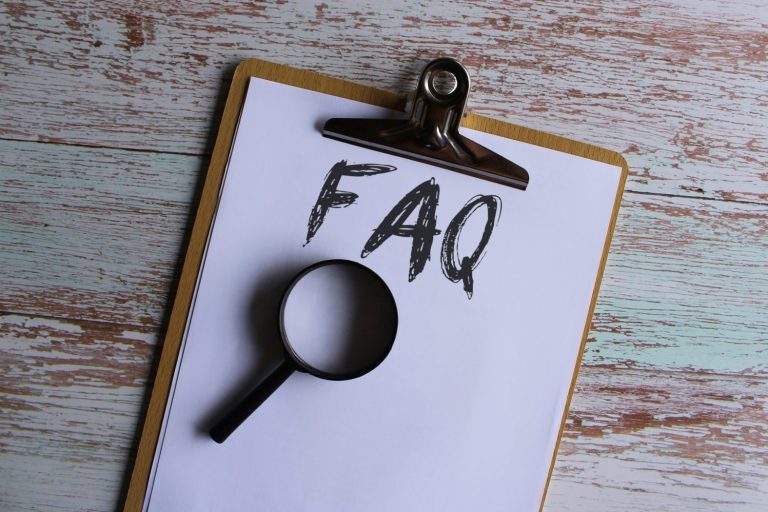Back in 2013, when there were just three of us working in this business, we were delighted to be awarded Google Partner status. Back then it was a really big thing for us, as it allowed us access to the Google Partner suite of tools and recognised that we had the necessary competencies to work on customers PPC accounts.
Fast forwards to 2020 and we now handle more Google advertising revenue than ever, we have more staff who have passed their Google exams and still retain the Google Partner badge.
But all that could be about to change.
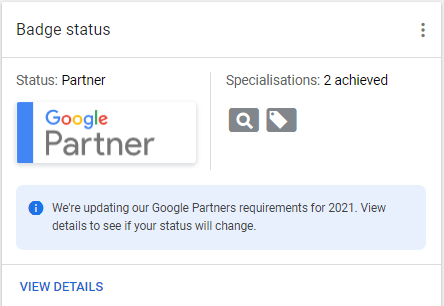
In our Google dashboard there is a ‘Badge Status’ panel, and this tells us whether we qualify to be able to display the Google Partner badge. We know that our requirements are a certain amount of revenue going though our account, a certain number of staff qualified, and a certain number of customers retained and grown throughout the year.
As we are a growing business, it has never been that hard to meet all these requirements, other than the time and effort we have to take to ensure that as many staff as possible are Google Ads Qualified.
But a seemingly innocuous note on our Badge Status has thrown all this into disarray.
The wording says “We’re updating our Google Partners requirements for 2021. View details to see if your status will change.”
When we click through and explore the detail, it looks on the face of it that we might have some trouble in 2021 when this all changes, as it seems we haven’t got enough qualified staff.
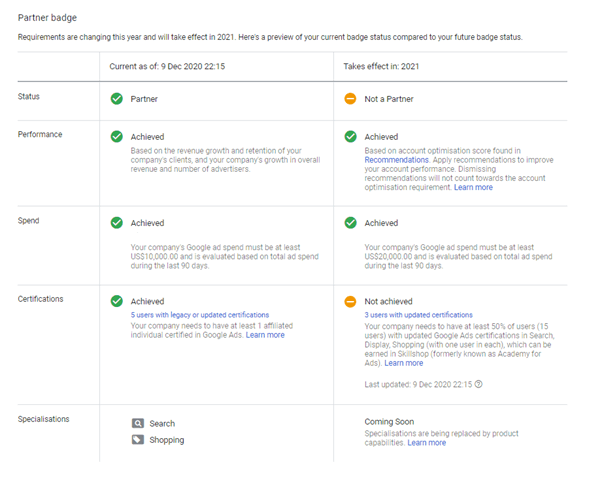
What worried me initially is the note that says we must have 50% of our users accredited, and according to Google that’s 15 staff members. That means Google thinks we have 30 members of staff.
The worrying bit is that we don’t have 30 members of staff.
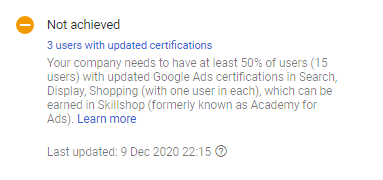
It turns out that Google are counting anyone with a Gmail account as being a ‘member of staff’, so a number of our customers are automatically included in the calculation as Google believes them to be our staff.
Of course, this is nonsense, and we are already working on a solution for this, though we are quite perturbed that we have to put time and effort into sorting out what is essentially, Google’s mess.
The most concerning part however is not the number of users, but the seemingly innocuous ‘Performance’ metric.
To date, performance has been measured “Based on the revenue growth and retention of your company’s clients, and your company’s growth in overall revenue and number of advertisers.”
Whilst that hasn’t always been easy, particularly in the early days when we were trying really hard to grow the business, it was at least an achievable metric. And we understood why Google would do this. Like any sales organisation, you reward your sales people for driving increased customer numbers and spend, and in essence, all Digital Agencies are salespeople for Google.
The new metric however should give all agencies cause for concern.
It says “Based on account optimisation score found in Recommendations. Apply recommendations to improve your account performance. Dismissing recommendations will not count towards the account optimisation requirement.”
This is deeply disturbing.
Every account we manage has, at the top, a series of recommendations which Google apply automatically to the account. These are not based on human intervention or an understanding of the customer and their needs, but completely automated and in theory, based on driving better results for customers. But sadly, many of them drive results by driving increased spend.
And most worryingly, it says that if you dismiss the recommendations, this won’t count.
Well, now we are on the horns of a dilemma.
As a practical example, our top recommendation is that our customers aren’t spending enough;
Now, we work closely with our customers and know how much budget they have, and have spent a lot of time with most of them optimising the accounts to drive the best performance we can within their budget constraints.
Google, however, is now telling us that unless we make them spend more, we could lose our Partner badge.
Frankly, it doesn’t feel right, and other Google Partner agencies we have spoken to feel exactly the same. It feels like a monopoly organisation using coercion to generate additional revenue with no regard for their customers.
The next recommendation is that we should ‘Add new keywords’ and it offers us 776 recommendations with a convenient ‘Apply All’ button next to it.
Honestly, this is nonsense. How can any Agency worth its salt simply click apply all? What on earth would they be applying to their customers’ accounts?
Given that so much of our time is spent making sure our customers only receive the right clicks from the right searches, and removing anything that delivers sub standard or incorrect clicks, this is tantamount to opening Pandora’s Box.
If we did this to our biggest customer, I know for certain that the next thing to happen would be us receiving our notice of contract termination. It is madness.
Similarly, applying Maximise Conversions is another recommendation we are supposed to follow, but in most cases, we’ve tried this with the customers and found it to be less effective than our existing strategy.
The problem is, Google doesn’t seem to care. Apply it or lose your badge. Recommendation after recommendation, most of which are irrelevant, currently clutter our dashboard and those of our customers. We routinely review them and if they are relevant, we will apply them, but more often than not, we dismiss them.
The problem is, from 2021, when we dismiss them, are we harming our chances of retaining our Partner Status? What exactly are the rules behind this and what do you do if you have already optimised it to the very best of our ability?
Helpfully, Google explain all on their Partner page and this is what they say;
Meet the performance requirement by using Google Ads effectively to set up and optimally run campaigns to maximize outcome.
Partners are not required to adopt all recommendations or achieve a 100% optimization score for the new Google Partners badge requirements. The threshold for the new Google Partners badge requirement is 70%. We introduced optimization score to help customers understand if their campaigns are set to achieve high performance and to offer actionable recommendations for improvement. We’ve found that advertisers who increased their account-level optimization score by 10 points saw a 10% increase in conversions, on average.¹
Access your ‘Recommendations’ tab to see the actions you can take to improve your performance. Note: We evaluate the optimization score without dismissed recommendations for the company performance requirement
So, it is based on improvements Google has seen in other campaigns and I have no doubt that all this is statistically valid, but it’s still not right. And it’s not right, as it assumes that we either cannot, or are not doing our jobs.
Logically, if our staff are Google qualified and trained correctly, they will be optimising the campaigns for our customers. We shouldn’t need to be coerced into making changes ‘en masse’ to accounts just to meet some arbitrary requirements.
Whilst Google has dressed this up as being about helping customer achieve high performance campaigns, it has the feel of being a drive for additional cash.
And for a great many agencies, this won’t sit comfortably at all.
The solution? Well, our plan is to do what we have always done. If we meet the badge requirements, great, we will continue to display it, if not, no problem, we’ll just carry on doing great work for customers and helping them make the most of their advertising spend.
